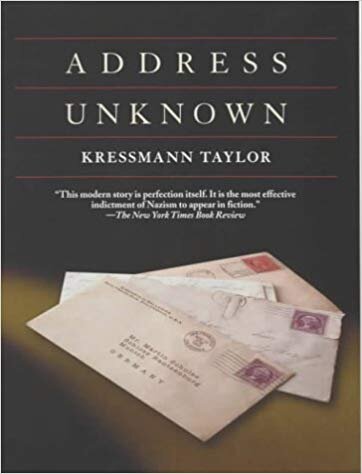Book Review - 'Address Unknown'
This book was first published in 1938, but I only became aware of it a few weeks ago when it was highlighted in the Guardian. After I read the article, I knew it was a book I had to read.
‘When events in our history change a life of open-mindedness and intolerance to the warped ideology of a dictator, the effect can be devastating. This enormously powerful tale brings an unprecedented vision of the horror and grief wrought by the Nazi regime.
Written on the eve of the Holocaust as a series of letters between an American Jew and his German friend, Address Unknown is a haunting tale of immense and enduring impact, exposing the poison of Nazism. This memorable story survives in an age of racial, ethnic and nationalistic intolerance as a searing reminder that history can repeat itself.’
This is the first time I’d heard of Kressman Taylor and the first book of hers I’ve read. It wasn’t published under her full name – Kathrine Kressman Taylor – because the publisher decided the story was “too strong to appear under the name of a woman”. But she didn’t seem to mind as she adopted ‘Kressman Taylor’ as her professional name.
It’s only a little book – 64 pages – but those few pages contain a very powerful story. The format is a series of letters between two close friends – an American Jew, Max, who used to live in Germany and his German friend, Martin, who’s returned to Germany with his family. Partners in business, they run a gallery in San Francisco under their joint names.
The first letter is dated November 1932, and it’s easy to see how close they are; they reminisce about the good times they had before parting company, and Martin’s children refer to Max as ‘uncle’.
By the time we get to July 1933, the tone of Martin’s letters is beginning to change. He writes, “I have never hated the individual Jew – yourself I have always cherished as a friend, but you will know that I speak in all honesty when I say I have loved you, not because of your race but in spite of it.” From that point, Max struggles to accept what is happening to his friend.
In Kressman Taylor’s hands, the transformation from close friends, almost brothers, to enemies, is handled deftly and, for me, believably. Words aren’t wasted, she keeps the focus between the two yet encompasses what’s happening on a larger scale.
In the ‘afterword’, written by her son, Charles Douglas Taylor, he used her own words to explain what inspired her to write the story, which included a personal experience. “[C]ultivated, intellectual, warmhearted German friends” of hers had returned to Germany after living in the States and, in a very short time, had turned into Nazis. When they visited again, they met one of their dear friends who happened to be a Jew. “They did not speak to him. They turned their backs on him when he held his hands out to embrace them.” And she wondered how on earth they could have changed so much.
Frightening. What makes it even more unsettling is this story was published in 1938, the year before the Blitzkrieg and four years before the chillingly named ‘Final Solution’.
‘Address Unknown’ was a success on publication. According to ‘The New York Times Book Review’ in 1939, “It is the most effective indictment of Nazism to appear in fiction.”
Although successfully published in book form in America and Britain, it didn’t appear on the Continent until 60 years later. Tellingly, it was on the Reichkommisar’s list of banned books.
In Kressman Taylor’s own words – “I wanted to write about what the Nazis were doing and show the American public what happens to real, living people swept up in a warped ideology.”
I firmly believe she achieved just that. Unfortunately, it also brings home how history appears to be repeating itself these very days.
